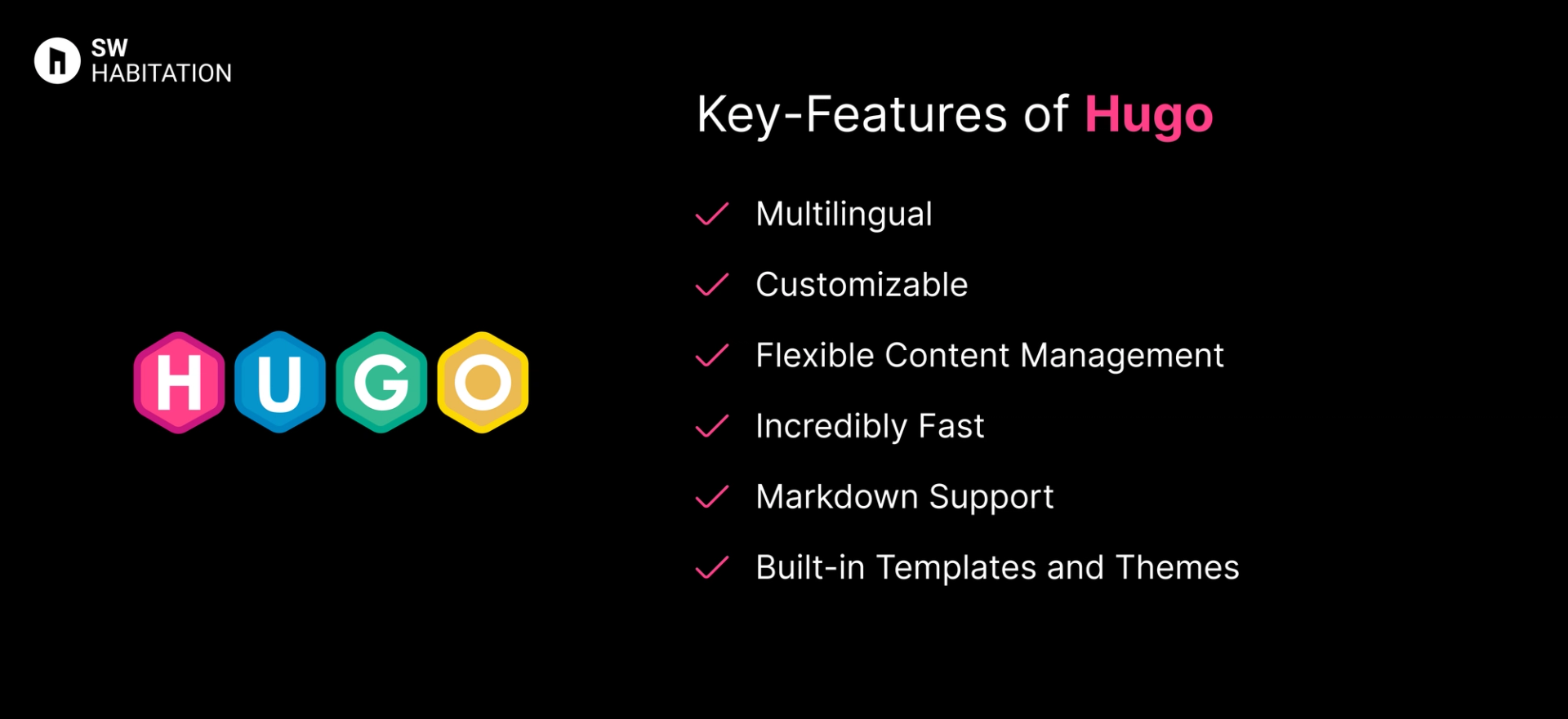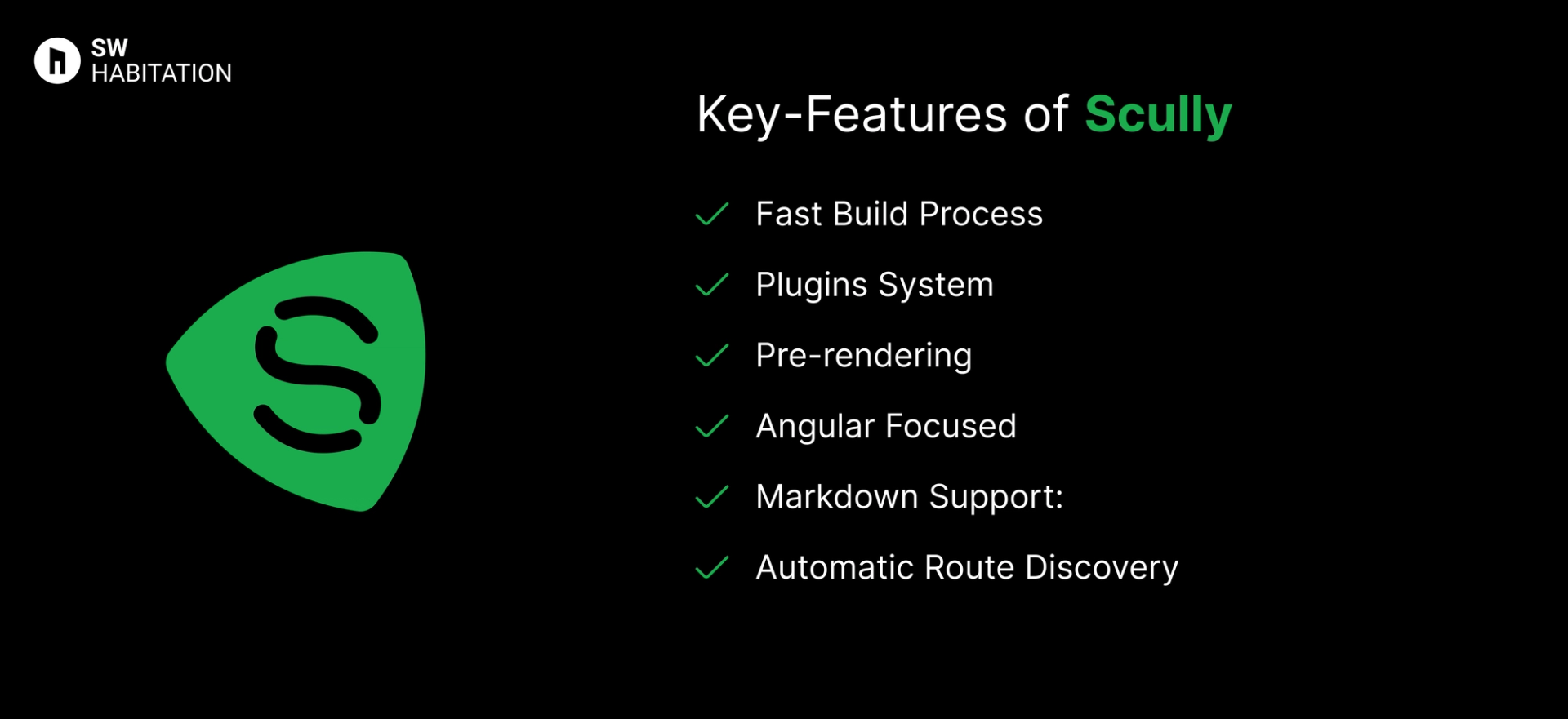Hugo vs. Scully

Hugo

Scully
Have you ever been to a website that loads super fast? Chances are it uses an SSG (Static Site Generator). It’s a tool that builds your site ahead of time, so when someone visits, they get the page instantly. No waiting around for things to load it’s just there.
What is Hugo?
Hugo is an open-source static site generator written in Go. It’s famous for its speed, being one of the fastest generators available, even with large websites.
Hugo uses Markdown files for content and allows you to customize your site with themes and templates. It’s simple, powerful, and perfect for those who want quick deployment with minimal setup.
Key Features of Hugo


- Multilingual: Easy setup for multi-language websites.
- Customizable: Plenty of configuration options to meet your needs.
- Flexible Content Management: Supports pages, posts, and taxonomies like tags and categories.
- Incredibly Fast: Hugo can generate thousands of pages in just a second.
- Markdown Support: Write in Markdown and Hugo will handle the rest.
- Built-in Templates and Themes: Use or create custom themes for fast and efficient development.
Advantages of Hugo
- Huge Community: With tons of themes, plugins, and community resources.
- Lightweight: Minimal dependencies required, which means less complexity.
- Full Flexibility: Create custom templates or use pre-built themes.
- Multilingual Sites: It’s a breeze to create websites in multiple languages.
- Super Speed: Hugo is one of the fastest static site generators available.
Disadvantages of Hugo
- Limited Plugins: While it has a good set, Hugo’s plugin ecosystem is not as huge as others like Gatsby.
- Requires Go Installation: You’ll need Go installed on your system, which could be a barrier for some users.
- Learning Curve for New Users: It can be challenging for beginners who aren’t familiar with the command line.
What is Scully?
Scully is the first static site generator for Angular. It takes your Angular app, crawls the routes, pre-renders each page, and exports static HTML files that can be served directly.
This results in faster load times and better SEO because search engines can read your content without waiting for JavaScript to execute.
Key Features of Scully


- Fast Build Process: Quickly converts your Angular app into a static site.
- Plugins System: Extend functionality with custom plugins for tasks like image optimization or content transformations.
- Pre-rendering: Generates static HTML for each route, improving performance and SEO.
- Angular Focused: Built specifically for Angular projects, making integration smooth.
- Markdown Support: Easily create content-driven sites using markdown files.
- Automatic Route Discovery: No need to manually define routes — Scully finds them automatically.
Advantages of Scully
- SEO-Friendly: Static content is easily indexed by search engines.
- Boosted Performance: Pre-renders pages for faster load times.
- Extendable: Customize builds with plugins tailored to your needs.
- Simple Setup: No complicated configurations —just install and go.
- Perfect for Angular: Seamlessly integrates with existing Angular projects.
Disadvantages of Scully
- Smaller Community: Compared to React or Vue SSGs, Scully has a smaller community and fewer resources.
- Learning Curve: Requires understanding of Angular and Scully’s pre-rendering process.
- Angular Only: Not suitable for projects outside the Angular ecosystem.
Comparison Between Hugo vs Scully
Use Cases of Hugo
- Fast Build Times: If you have a lot of pages, Hugo generates them at an incredibly fast rate.
- Static Websites: Ideal for creating portfolios, documentation, and landing pages.
- High-Performance Blogs: Perfect for personal and developer blogs with a lot of content.
- Multi-Language Websites: Easy to create and maintain multilingual sites.
Use Cases of Scully
- Portfolios: Highlight your projects with a sleek, fast portfolio.
- Personal Blogs: Markdown support makes blogging simple and fast.
- Documentation Sites: Pre-rendered content ensures fast, accessible documentation.
- Company Websites: Improved SEO and performance help showcase your business.
Other Resources
Conclusion
Static Site Generators are a big game changer if you’re looking to build a website that’s fast, secure, and easy to maintain. Whether you’re launching a personal blog, portfolio, or a business website, they give you the freedom to focus on what really matters, your content and your users without all the extra complexity.
The best part? You’re not locked into one way of doing things. You can choose the tools and tech you’re most comfortable with, and scale things up as your site grows. From lightning-fast load times to better SEO and easy hosting, SSGs make the whole process smoother.
At the end of the day, it comes down to what fits your workflow and goals best. Pick the one that feels right to your requirements, and you’ll be well on your way to creating a beautiful, high-performing website that you’re proud of 🙌
Frequently asked questions
Is Hugo good for large websites?
Hugo is particularly well-suited for large-scale websites with many pages, such as documentation sites, portfolios, and blogs.
Can I customize Hugo themes?
Yes, Hugo comes with a large selection of themes, and they are highly customizable. You can modify them or create your own theme from scratch.
Does Hugo support multiple content types?
Yes, Hugo is highly flexible and supports multiple content types, including Markdown, JSON, YAML, and HTML, making it suitable for all kinds of content-driven websites.
What makes Hugo so fast?
Hugo is incredibly fast because it’s written in Go, a highly performant programming language. It can build websites in seconds, even if they have thousands of pages.
Is Scully easy to integrate with Angular?
Yes, integrating Scully with Angular is simple with just a few commands. It works alongside Angular’s powerful features but optimizes it for static site generation.
Does Scully handle SEO?
Yes, Scully automatically generates meta tags, sitemaps, and other SEO-friendly elements for better search engine optimization.
What’s the main benefit of using Scully with Angular?
Scully gives Angular apps static site generation (SSG) capabilities. It helps you pre-render pages at build time, improving page load speeds and search engine visibility.
Can I use Scully with any Angular project?
Yes, If you're already using Angular, you can add Scully to your project to generate a static version of it for better SEO and performance.
